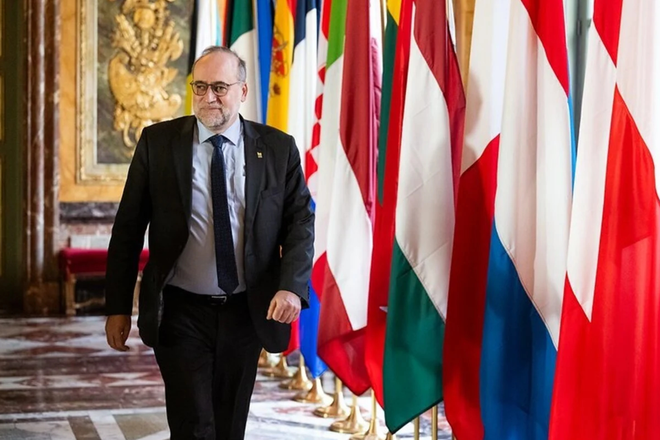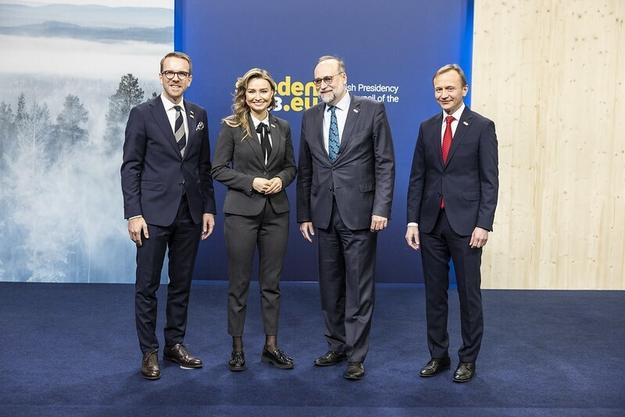During the EU pre-accession negotiations, he was part of the negotiating team, wrote the application on his computer, and sat next to chief negotiator Ján Figeľ at the accession negotiations. He was responsible for making sure the Slovak side always had all documents and materials ready.
Upon graduating from university, PETER JAVORČÍK went straight into the Foreign Affairs Ministry. In 1992, when it was already clear that Czechoslovakia was falling apart, the Slovak Foreign Affairs Ministry was being created. At the time he was 25 years old. "My entire class from the Institute of International Relations of Comenius University - Ivan Korčok and Rastislav Káčer were among my classmates - moved to the ministry and we started working as young diplomats," he recalls.
Today he is the Director General at the General Secretariat of the Council of the EU, the highest position held by a Slovak citizen in its administrative structures, contributing to the EU being able to agree on a common course of action in environmental protection, transport, education and energy.
How do you remember the day Slovakia joined the EU?
I have a lot of emotions. There is the sense of satisfaction and pride, as I had dedicated ten years to this goal, and it was fruitful. It was also very motivating; and then a good feeling when we succeeded. Slovakia also changed a lot during that ten-year journey. Perhaps the most in its entire history, not only from the point of view of law, but how society functioned overall, because the vision of joining was very motivating.
Officially, the accession began when then prime minister Vladimír Mečiar submitted the application at the 1995 European Council Cannes summit. Were you there?
I have a special relationship with the application. It was my first trip to a European summit. Actually, the application consisted of just two sentences; Slovakia is applying to join the EU, and a referral to the relevant article of the EU legislation. I wrote those sentences on my work computer and I carried the sheet signed by the then prime minister to Cannes in my suitcase.
What was the atmosphere like when you submitted the application? At that time, Slovakia was already receiving démarches in which EU institutions expressed concern about the development in the country.
Jacques Chirac, then French president and chairman of the European Council, did not really want to meet Mečiar personally, who no longer had a good reputation at that time. In the end, the submission did not even take place at a very formal meeting, but in a hotel lobby, and the application was just handed over to the French foreign affairs minister. This was legal, it did not have to be handed to Chirac himself; but it was already a sign that our path to the union would not be easy.
How did Vladimír Mečiar feel about joining the Union?
He knew that his domestic policy was not compatible with the goal of joining the EU. When Slovakia was not invited to negotiations together with the Czech Republic, Poland and Hungary in 1997, it was shocking and sobering. This was a clear sign that Slovakia was lagging behind and its place in the union was not guaranteed. Until then, the Government Office naively believed that if Slovakia's neighbours were invited, it would be as well. As it turned out, Slovakia was not invited. This probably motivated people and explains why the 1998 elections turned out the way they did. Suddenly, the situation in Brussels changed; while receiving Mečiar was crossing the line, receiving then new prime minister Mikuláš Dzurinda was problem-free; and we felt support, both from the EU and from the member countries at the time, for us to catch up very quickly with our neighbours in the integration process.
Was 1997 a shock for you, diplomats and officials?
No, we knew what was going on and that Slovakia wouldn't be invited. We wrote a lot about it and in detail from Brussels, where I was then the first secretary at the Slovak representation to the EU. However, our diplomatic warnings were not sufficient to motivate prime minister Mečiar to change Slovakia's course. The change occurred only after elections.
You mentioned prime minister Dzurinda. Would you be able to pick specific people thanks to which Slovakia is in the union?
At the political level, prime minister Dzurinda and the chief EU accession negotiator Ján Figeľ, who led the negotiation team. But the entire Slovak government was highly motivated, as was the Slovak parliament. When we told them that specific legislation had to be adopted in order to close a certain element of access, it was given priority and things went incredibly smoothly because the political motivation and will were both there. Then at the expert level, there were dozens of people in all ministries and at the representative office. Positions were prepared and coordinated, necessary legislative changes were made. It was a great team performance.
How was Slovakia perceived in Brussels after the fall of the Mečiar government? Was it four Central European countries again, or three countries plus a problematic one?


 Slovak diplomat Peter Javorčík. (source: Archive of P. J.)
Slovak diplomat Peter Javorčík. (source: Archive of P. J.)
 Peter Javorčík (second from right) with Swedish Energy Minister Ebba Busch (second from left) and Transport Minister Andreas Carlson (first from left). (source: Archive of P. J. )
Peter Javorčík (second from right) with Swedish Energy Minister Ebba Busch (second from left) and Transport Minister Andreas Carlson (first from left). (source: Archive of P. J. )